- Home
- Michael Dobbs
The Reluctant Hero Page 6
The Reluctant Hero Read online
Page 6
They waited for Martha, then they waited some more. Bowles tapped his foot in exasperation, Proffit meandered off in search of a drink, Malik sat in a corner studying his briefing notes while Harry asked himself yet again what the hell he was doing here. He had no plan, or at least nothing he regarded as shower-proof let alone watertight. The closest he’d got was a plan so simple it bordered on the preposterous. Its sole merit lay in the fact it was so outrageous, it might just take everyone else by surprise, too, catch them napping. He would simply ask them to release Zac.
Outrageous, certainly, but perhaps not as stupid as it sounded. There were ties between Britain and Ta’argistan. The Central Asian state was desperate for aid, for experts, for sound advice, anything that might help it drag itself out of their yurts and into the twenty-first century. Many homes were still heated with dried camel turd, their walls built of mud, and the industrial infrastructure consisted of little more than haystacks and holes in the ground. The Ta’argis also needed help in clearing up the irradiated rubble left behind by the Soviets. In return for help in these matters, Britain’s rewards were likely to be less tangible. She’d gain a friend in a sensitive part of the world, and Britain had grown rather short of friends in recent years. If they were lucky, the Brits might discover that the Ta’argis, like some of their Central Asian neighbours, were sitting on an endless supply of oil or natural gas or uranium, buried somewhere deep inside the Celestial Mountains. That was a long shot, of course, but modern diplomacy was little more than a crap shoot, and you had to be in the game to stand any chance of winning.
A new world was waiting only to be discovered, yet for the moment it would have to wait on Martha. Sydykov paced up and down the foyer, examining his watch, his smile growing more forced with every glance. When, finally, she reappeared, blown and brushed, Bowles exploded in a theatrical gesture of impatience. ‘Really, Martha!’ he snapped.
‘Why, Roddy,’ she said as she breezed past in the direction of their waiting bus, ‘you’d spend more time with your hair, if you had any.’
His hand came up defensively to the sparse patch on the back of his head, as though to brush it away. He gave a snort of rebuke. Then he followed.
Soon they found themselves heading for the White House, the Presidential Palace. It proved to be an uncomfortable, angular building of six floors set in the centre of the city behind ornate railings, its name coming not in imitation of the US President’s home but from the pale stone cladding used in its construction. Harry recognized the style; Soviet, nineteen-sixties, built off a plan drawn up in some office in Moscow, presumably the same office that had supplied the plans for Lenin’s mausoleum. The entrance was guarded by young soldiers in exaggerated flat felt hats the size of dinner plates who snapped to attention as the visitors approached. Inside, the reception hall was vast, largely empty, like an aircraft hangar, every step echoing on the pink-marble floor. By contrast, the lift up to the top floor was claustrophobic and slow. They found themselves disgorged into a reception room, where they were greeted not by the President but by a man of slightly less than average height with a lean, pinched face and hair plastered thinly across his skull. He was wearing circular rimless glasses, and the eyes behind them were bright and almond-shaped, betraying the presence of something Mongol in his genes, yet his skin was pale by the standards of most mountain men, as though he rarely saw the light. With his sloping shoulders and modestly cut suit he gave the impression of an academic, a professor who loved nothing more than spending his days with books. Sydykov made the introductions.
‘May I introduce to you Mr Amir Beg,’ he said, ‘the President’s chief of staff.’
‘Welcome to the Presidential Palace,’ Beg said, offering a polite bow but without shaking hands. His English was halting but, as his guests were to discover, usually technically precise. ‘The President will be with us shortly. I’m afraid I can offer you no more than fruit juice, since the President himself doesn’t touch alcohol.’ He waved to trays carried by young girls in colourful native costumes.
‘That wasn’t in the bloody briefing,’ Proffit muttered in a theatrical whisper from the back of the group.
‘You never read the briefing,’ Bowles responded, leading the charge for the trays.
Apart from Beg and Sydykov there were only three other Ta’argis present, officials from various economic ministries; it was destined to be a small gathering. The room, like so much else in Ashkek, was stiff with formality and too large for their number, and fruit juice wasn’t going to help. Two oversized portraits of the President hung at either end, and the only splashes of colour came from cultural artefacts and murals on the walls. Many of the designs featured horses.
‘Used to do a little hunting myself when I was younger,’ Proffit ventured, tugging wistfully at his whiskers.
‘We Ta’argis are – or were – nomads,’ Beg said. ‘We claim descent directly from Genghis Khan. Our horses represent our freedom.’
‘Then Martha here should feel at home,’ Proffit exclaimed jovially. ‘I’ve always suspected she was in direct line from Cochise and the Sioux.’
‘Cochise was an Apache.’ She arched an eyebrow. ‘And I’m half-Irish.’
‘The other half?’ Proffit enquired.
‘Pure skunk.’
Proffit was about to offer several further observations about her probable genealogical roots when the large carved wooden doors at the end of the reception room swung open. Everyone turned, and fell to silence as Mourat Karabayev, the President of the Republic of Ta’argistan, strode through the doors, accompanied by two large hunting dogs close at his heels. He was tall for a Ta’argi, in his early fifties and only a little over-weight, with a full head of dark waving hair swept straight back from the temples. He had the high, prominent cheekbones so characteristic of his people, and a small but deeply incised scar just below his right eye. He also had a nose that at some point in his life had been badly broken.
‘Mr Bowles, it is so good to see you again,’ he said, extending his hand and sniffing – his broken nose seemed to give him the need to snuffle repeatedly. ‘And all of you: Mrs Riley, gentlemen, you are most welcome. I am sorry if I have kept you waiting. You must be hungry. Let’s eat!’
His suggestion was more than hospitality; it implied a man short of time and, perhaps, with limited patience. At a brisk pace he led them through to a neighbouring room that was much smaller, with windows on two sides facing out across the city, where the lights were beginning to change as shops were shuttered and in their place the nightspots came to life. Yet the view inside the room proved far more tempting. In discretely lit display cabinets hugging every wall was housed a collection of gold artefacts, exceedingly old and in remarkably fine condition. Items of jewellery, ornamental horse harnesses, burial goods, Buddhist figurines both seated and standing, ancient coins, amulets, with every piece crafted from gold. The display was overshadowed by yet another portrait of the President, watching protectively over a dining table set for ten. Karabayev took his place in the middle, looking out over his city, Bowles sat opposite. The two groups didn’t mingle but found their seats on either side of the table – like North and South Korea, Harry thought. Beg was at the President’s right hand, and Martha next to Bowles. It made Harry wonder if Bowles had been responsible for the British seating plan; he was left in no doubt when he found himself ushered to the floating seat at the very end of the table.
The meal was simple – meat that might have been mutton, with cabbage and potatoes. And cheese. Mountain food. Alongside the fruit juice, they were also offered a drink of sour-smelling liquid that was described as fermented mare’s milk, but even Proffit took only a cursory sip. The glasses were kept topped up, and they talked: of aspirations, of industries, of economic ties and political ambitions, all the many things that might turn the myth of the Silk Road into a modern reality. Then Karabayev raised his glass of mare’s milk and offered a toast: ‘To friendship.’
‘To trade,’ Bowles re
sponded.
‘To aid,’ the President added.
Bowles smiled and sipped his fruit juice.
‘And in return for that aid?’ It was Martha. As usual, there was a note of challenge in her voice.
The President stared across the table. ‘In return? Why, our friendship. We are a proud and independent people, Mrs Riley, a natural ally of the West. Friendship in a turbulent world has its own value, I think.’ But he could see he had failed to impress Martha. ‘Is there more you would want?’
‘I’m a democrat, Mr President. You want my friendship, I want more openness. Human rights. Free elections. I hope you’ll forgive me speaking candidly’ – her lips were working as though chewing a large wad of tobacco – ‘but I keep hearing claims that the last election was rigged.’
An uncomfortable silence settled upon them all. While he considered his answer, Karabayev threw morsels of meat to the two dogs, whose jaws snapped hungrily. Then he sniffed, pretended a smile, showing a set of perfect white teeth that Harry suspected might even be his own.
‘Yes, democracy. A delicate flower, Mrs Riley, too easily trampled by . . . careless criticism.’ He threw more meat to the dogs before wiping his hands and turning his full attention to her. ‘You shouldn’t listen to lies peddled by the disappointed. And might I suggest you take care when you offer lectures about democracy? After all, your own government was elected by barely a quarter of the voters while your head of state isn’t elected at all. And as for your House of Lords . . .’ He turned to Sid Proffit, a.k.a. Lord Proffit of Chipping Sodbury. ‘I hope you will not take this personally, but the entire world sits back in bewilderment at a house of Parliament filled with nothing but placemen and hereditary aristocrats. It is . . .’ – he searched for the appropriate term – ‘quaint. But scarcely democratic.’ He held up his hand to stall the imminent outpouring of rebuttal from Martha. ‘Yes, yes, I know, you have your own way of doing things, but so do we. In Ta’argistan we like to work in harmony with the people. The government and governed are as one. All in step.’
Harry could almost hear the tramp of marching boots echoing through the streets.
‘It is an ideal more easily aspired to than achieved, I know,’ the President continued, ‘but that’s why the foremost task of my loyal lieutenant here –’ he placed his hand on Amir Beg’s shoulder – ‘is to ensure that it becomes a reality.’ He made it sound as if Beg was a spin doctor. Beg smiled, nodded his head to acknowledge the recognition, although his knuckles showed white. They usually did, Harry had noticed. They were remarkably uneven, like a mountain range, as if at some point they had been badly broken. Perhaps that was why he didn’t shake hands.
‘If you want more aid, we need to see progress on human rights,’ Martha persisted.
‘We have nothing to hide.’
‘Really? That’s not what I hear.’
‘And what is it, precisely, that you hear, Mrs Riley?’ Karabayev sniffed.
‘All nature of things. Domestic violence on women being the norm. Bride kidnapping. Harassment of the gay community. And I can give you a list of opponents who seem to have disappeared inside your prisons.’ As she was speaking she reached out to stroke one of the dogs that was prowling around the table in search of more treats. In return what she got was a deep, glottal growl and a curled lip that revealed large yellow teeth.
‘I’d advise against that, Mrs Riley,’ the President warned. ‘They’re not pets.’ His voice had grown quiet, almost soft, but he was no longer even pretending to smile. ‘As for lists, I can offer you lists, too, if that’s what you want. About your own country. Unless I am very much mistaken, Britain has the highest prison population in Europe. Isn’t that so? And the highest levels of crime, the highest levels of homelessness. And what did your Leader of the Opposition say just last week? I seem to remember he talked about cities littered with drug addicts where the streets are patrolled by pimps and prostitutes.’ He brushed a piece of imaginary lint from the front of his jacket. ‘We can all play games with statistics, Mrs Riley, but I find it a fruitless exercise. In Ta’argistan, we do our best, in difficult circumstances.’
Beg joined the battle. His accent was less fluent than his President’s, yet his voice conveyed remarkable passion. ‘Twenty years ago, there was no freedom in our country. The half that wasn’t used as a training ground by Soviet special forces was used as a dumping ground for its nuclear industry. And we need no lectures about prisons, Mrs Riley. Both the President and I had the pleasure of spending several years as guests of our Soviet masters. If our hands aren’t yet as clean as you might like, it’s only because we haven’t finished washing them of foreign dirt.’
Karabayev took up the reins once more. ‘Please don’t mistake us for barbarians, Mrs Riley. Look around you. These beautiful artefacts were being fashioned at a time when in your own country I believe the natives wore animal skins and daubed their bodies in coloured mud.’
She was about to protest that she had been born an American, but held her tongue. Somehow, she doubted that waving the Stars and Stripes would help.
‘This place was the crossroads of many ancient civilizations. We are a proud people, an ancient race. We ask for nothing other than respect.’
‘And a little aid,’ she reminded him.
Karabayev was on his feet, his face stiff. ‘I’m sure we could swap stories all night, but you will have to continue without me, I fear. Affairs of state, you understand. I shall leave you in Amir Beg’s capable hands. Goodnight.’
With a final snuffle, he was gone, pursued by the dogs. Bowles glared at Martha, she fixed her gaze on her mare’s milk, and Sid Proffit took another, and longer, exploratory sip. Meanwhile, Harry’s heart sank. The President had disappeared, and with him had vanished any chance Harry might have had of simply asking for Zac’s release, as an act of friendship. Martha had really mucked that one up. Blown it to pieces. It had always been a long shot, he knew, but so much less painful for him than any of the alternatives. His eyes were drawn once more to Beg’s obliterated knuckles. Something about this man told Harry that nothing would ever be achieved here without very considerable pain.
Bowles’ eyes continued to glow red with anger, as if with a little more focus they might encourage Martha into an act of spontaneous combustion. There would be words later, yet the hole in the evening was quickly filled as Beg nodded towards Sydykov and the President’s chair was removed. One of the servant girls – Harry wanted to use the term waitress, but there had been a feudal touch about the entire proceeding – took Beg’s chair and put it in the President’s empty place. Harry couldn’t help but feel there was something symbolic in the act; it was as though Beg was staking a claim. And as though in proof of his independence, another nod of his head brought alcohol. Beer and vodka. From Kazakhstan and Finland.
‘Bit of a miracle,’ Proffit declared jovially, wobbling his whiskers. ‘Fruit juice into wine. Whatever next?’
‘I thought it was forbidden,’ Bobby Malik said.
‘Not at all,’ Beg replied, draining his glass of vodka and holding it out in his crooked hand to be refilled. ‘It’s simply that the President has a gastric complaint which is inflamed by alcohol.’ He looked around the table and smiled. ‘I don’t.’ He seemed entirely at ease standing in for the President, and for another hour the dinner continued as those present broke up into groups around the table and Beg talked with animation and considerable informality one by one to his guests.
It was near the end of the evening before Beg joined Harry, who was standing admiring one of the displays, a figurine of beaten gold, a mountain goat whose right leg had gone missing somewhere along the centuries. Yet the damage couldn’t detract from the elegance of the craftsmanship. Karabayev had been right. Nothing like this could have been produced in Britain at that time, not for another thousand years.
‘Beautiful, is it not?’ Beg enquired.
‘I find it stunning. The rest of the artefacts, too.’
‘
They were uncovered almost ten years ago in burial
grounds in the south of our country. Yale University gave a grant to help us preserve the collection.’
‘More aid.’
‘A necessity of life in a country such as ours.’
As Harry turned to face Beg, he realized the Ta’argi was smaller than he had realized, a good seven inches shorter than himself, forcing him to lean down to make sure he caught everything that was said. It made their conversation almost conspiratorial. It was the chance he had been looking for.
‘Mr Jones, you are most welcome in my country. I know very little about you – you haven’t visited us before. You have kept very quiet this evening – and you are not drinking.’
‘Don’t worry, nothing religious. Just pacing myself.’
‘I hope we haven’t bored you. I would like us to become good friends.’
Harry was trying to judge the moment, and this was too soon, but it wasn’t a situation he controlled and his time was short. The other man had given him an opening, so he felt obliged to gamble. ‘We have a lot in common, Mr Beg.’
‘Really?’ Beg smiled, as if the thought gave him pleasure.
‘Yes. Like you I spent much of my professional life at war with the Soviets. Although not perhaps at such close quarters as yourself.’
‘Then you have been fortunate.’
‘I tried to help some of the resistance groups.’ He made it sound like charitable work, which was deliberately misleading. What Harry had done, during his time as a member of the SAS, was to help train the mujahedin in Afghanistan.
‘I hope you and your colleagues will be as keen to assist us now the Soviets have gone.’
Harry offered no immediate reply. He’d been sent into Afghanistan not to deliver aid but to show the rebels how to use their Stinger missiles and blast Soviet helicopters out of the sky, in mountains not three hundred miles from where they were standing.

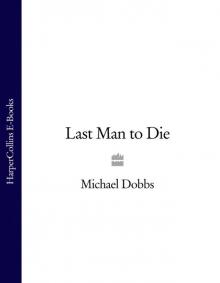 Last Man to Die
Last Man to Die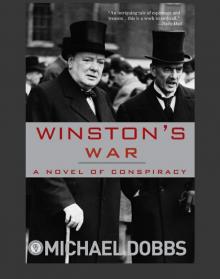 Winston's War
Winston's War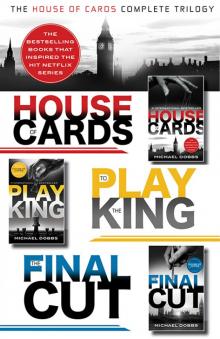 The House of Cards Complete Trilogy
The House of Cards Complete Trilogy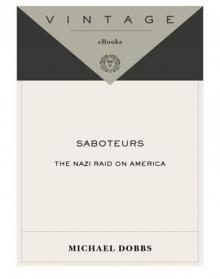 Saboteurs
Saboteurs The Touch of Innocents
The Touch of Innocents WC02 - Never Surrender
WC02 - Never Surrender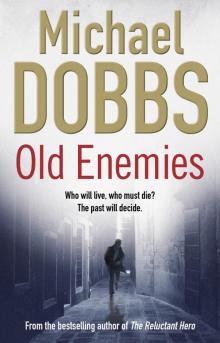 Old Enemies
Old Enemies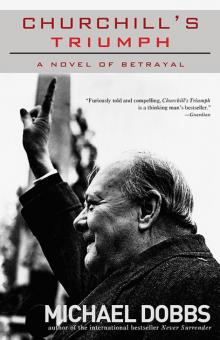 Churchill's Triumph
Churchill's Triumph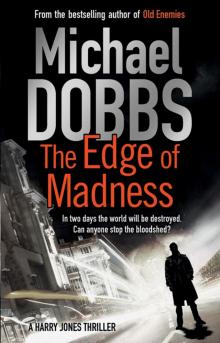 The Edge of Madness
The Edge of Madness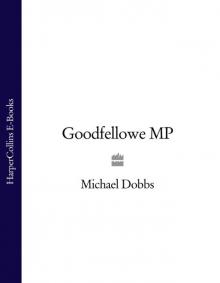 Goodfellowe MP
Goodfellowe MP The Final Cut
The Final Cut Whispers of Betrayal
Whispers of Betrayal Churchill's Hour
Churchill's Hour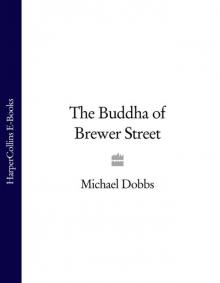 The Buddha of Brewer Street
The Buddha of Brewer Street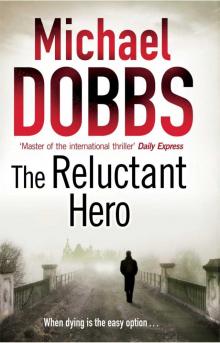 The Reluctant Hero
The Reluctant Hero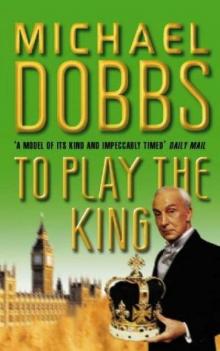 To Play the King
To Play the King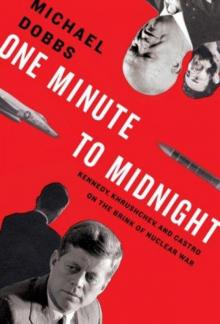 One minute to midnight
One minute to midnight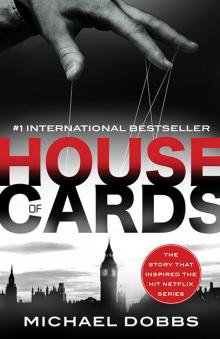 House of Cards
House of Cards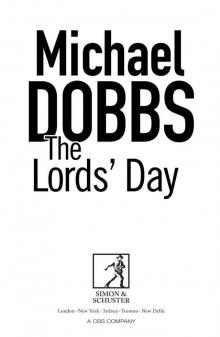 The Lords' Day (retail)
The Lords' Day (retail)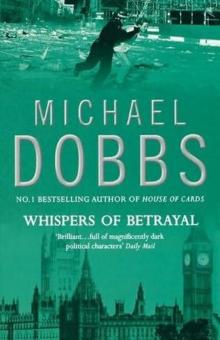 Whispers of betrayal tg-3
Whispers of betrayal tg-3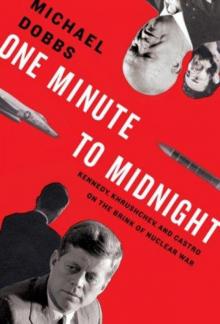 One minute to midnight: Kennedy, Khrushchev, and Castro on the brink of nuclear war
One minute to midnight: Kennedy, Khrushchev, and Castro on the brink of nuclear war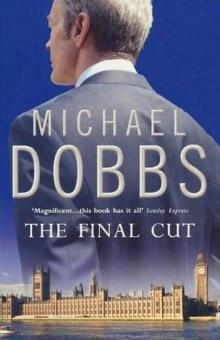 The Final Cut fu-3
The Final Cut fu-3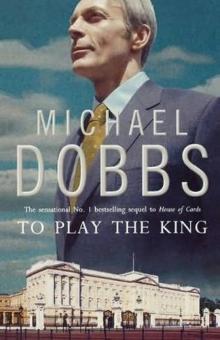 To play the king fu-2
To play the king fu-2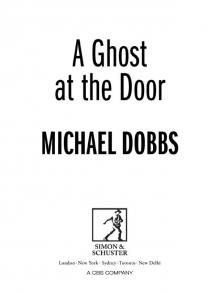 A Ghost at the Door
A Ghost at the Door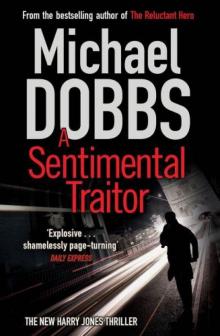 A Sentimental Traitor
A Sentimental Traitor